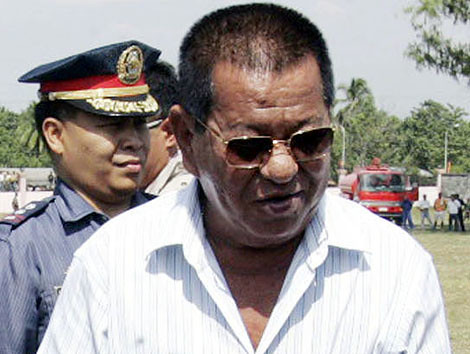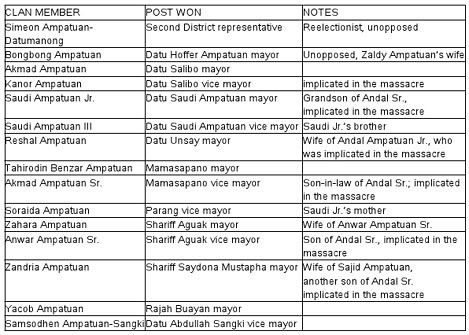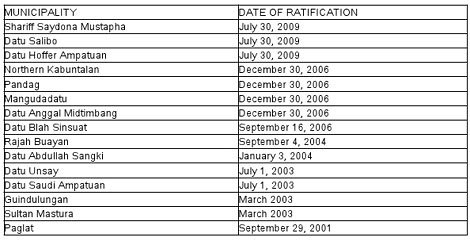Filtered by: Topstories
News
Ampatuan clan the biggest winner in May 2010 polls
By KAREN TIONGSON-MAYRINA, GMA News Research
(Part one of a three-part series on victorious political clans in the May 2010 elections.) Their clan is accused of the worst electoral violence in the country’s history. Six of its leaders are detained, including the patriarch. Their family name is now commonly associated with massacre. Yet the Ampatuans still emerged as the winningest political family in the May 2010 elections, according to a study of 2010 election returns by GMA News Research. Despite the defeat of detained and accused clan patriarch Andal Ampatuan Sr. in the vice gubernatorial race in Maguindanao, at least 15 Ampatuan family members won electoral victories in the province, led by reelected Second District Rep. Simeon Datumanong, Andal Sr.’s nephew.  Esmael Mangudadatu, scion of the Ampatuans’ rival clan, defeated an Ampatuan for the governorship of Maguindanao, six months after the massacre that claimed the lives of Mangadadatu’s wife, two sisters, and 54 others in the heart of the Ampatuans’ bailiwick in Maguindanao. But Mangudadatu’s victory apparently did not indicate a wider shift in power, as the Ampatuans retained direct control of a fourth of the province’s towns. An Ampatuan now sits as mayor in eight municipalities, apart from six elected vice mayors (see table). Some of the winners were either charged or named by witnesses for their alleged roles in the Ampatuan (Maguindanao) Massacre on Nov. 23, 2009. Our study showed that at least 64 political families have two or more members who won national or local posts in the recently concluded elections. Of those 64 clans, only the Ampatuan family and the Singsons of Ilocos Sur have more than 10 winning relatives, with the Ampatuans by far the champion with 15.
Esmael Mangudadatu, scion of the Ampatuans’ rival clan, defeated an Ampatuan for the governorship of Maguindanao, six months after the massacre that claimed the lives of Mangadadatu’s wife, two sisters, and 54 others in the heart of the Ampatuans’ bailiwick in Maguindanao. But Mangudadatu’s victory apparently did not indicate a wider shift in power, as the Ampatuans retained direct control of a fourth of the province’s towns. An Ampatuan now sits as mayor in eight municipalities, apart from six elected vice mayors (see table). Some of the winners were either charged or named by witnesses for their alleged roles in the Ampatuan (Maguindanao) Massacre on Nov. 23, 2009. Our study showed that at least 64 political families have two or more members who won national or local posts in the recently concluded elections. Of those 64 clans, only the Ampatuan family and the Singsons of Ilocos Sur have more than 10 winning relatives, with the Ampatuans by far the champion with 15. Members of the Ampatuan-Datumanong clan who won local posts in Maguindanao 
Municipalities created in Maguindanao from 2001 to 2009 
In those 15 new municipalities, six were led by an Ampatuan mayor. In the May elections, the family fielded more than one relative in most of the posts they ran for. “That was exactly the intention in creating new municipalities: so the clan members could be placed there," the analyst said. “Whatever happens, the clan has somebody in the local government administration." Besides a private army and bulging bank accounts, the strategy demonstrates yet another asset the Ampatuans wield against their opponents: lots of family members who can run for office, some of whom were tapped to replace detained relatives as candidates nearly as smoothly as substitutions in a basketball game. – Researched and reported by Karen Tiongson-Mayrina and Allan Crispulo Vallarta, GMA News Research, edited by Howie Severino, GMANews.TV.

Andal Ampatuan Sr., the clan patriarch, paved the way for long-term control of Maguindanao province by engineering the creation of more municipalities where his family members could run. Office of the Press Secretary - File photo


Find out your candidates' profile
Find the latest news
Find out individual candidate platforms
Choose your candidates and print out your selection.
Voter Demographics
More Videos
Most Popular





